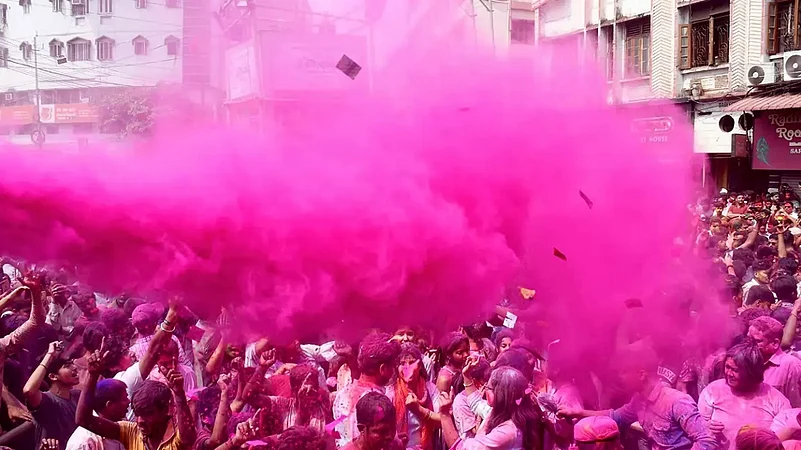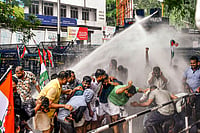Barpeta Satra, an important seat of Vaishnavite culture in Assam, is brimming with festivities as people have congregated here in large numbers during the four-day celebration of “Doul Mahotsav”.
More than a lakh people, including women who are otherwise barred from entering the Satra (monastery) at Barpeta, a town in lower Assam, during rest of the year, throng to the monastery which comes alive with colour, Holi songs, and 'bhaonas' (theatre) during “Doul Mahotsav”.
The Barpeta Satra, 95 km from Guwahati, was founded by Vaishnav saint Sankardeva's disciple Madhavdeva. ''The Doul Mahotsav celebrated at this satra is unique to the region and is based on the legend of Lord Krishna's visit to his consort Ghunusa that angered his wife'', Satra secretary Prabhat Das said.
The first day of the festival, called 'Gondh', begins with a bonfire of reeds set ablaze by 'bhakats' ( disciples) of the monastery in front of the main 'kirtanghar' (main prayer hall), he said.
The ‘kirtanghar’ is an architectural marvel, reflecting the simple but distinctive characteristics of the `namghar’ (prayer hall ) as visualised by Sankardeva. Major religious activities of the monastery are held there, the monk currently in charge of the satra, Gautam Pathak said.
The image of Krishna, also called 'Kaliya Gosain' (the dark lord) by the locals, is carried around in a procession with devotees playing cymbals and drums. The image is then placed near the fire before being taken back into the shrine.
The grand finale of the festival on the fourth day, to be held on Thursday, is called 'seuri' where Krishna's image is placed in a palanquin and taken out in a grand procession around the town, ostensibly to Ghunusa's house, by devotees smeared with 'fakua' or coloured powder.
After the procession, the devotees bring back Lord Krishna to the Satra where he is barred entry to his home by an irate wife. The devotees divide themselves into two groups--one supporting Krishna and the other his wife--and engage in a heated argument, ultimately breaking bamboo barriers. ''People from Barpeta who are settled in any part of the state or the country try to come to the town during Doul
Utsav as it is inextricably associated with our heritage and culture'', 32-year-old Mumbai-based bank official Dhrubajyoti Mishra, who has come home on his annual leave to celebrate the festival, told PTI.
''We do not usually go to the Satra but during the annual festival of colours, we finish our household work early and reach the monastery to get a vantage point from where we can watch the proceedings'', said 40-year-old housewife Rekha Sarma.
Noted photographer Ratnajit Choudhury said that this festival in Barpeta can be a flagship event and ''we are trying to highlight its uniqueness by organising photography events so that the pictures uploaded by the photographers on their social media handles will attract tourists''. The district administration makes elaborate arrangements to ensure the smooth conduct of the festival, officials said.


























